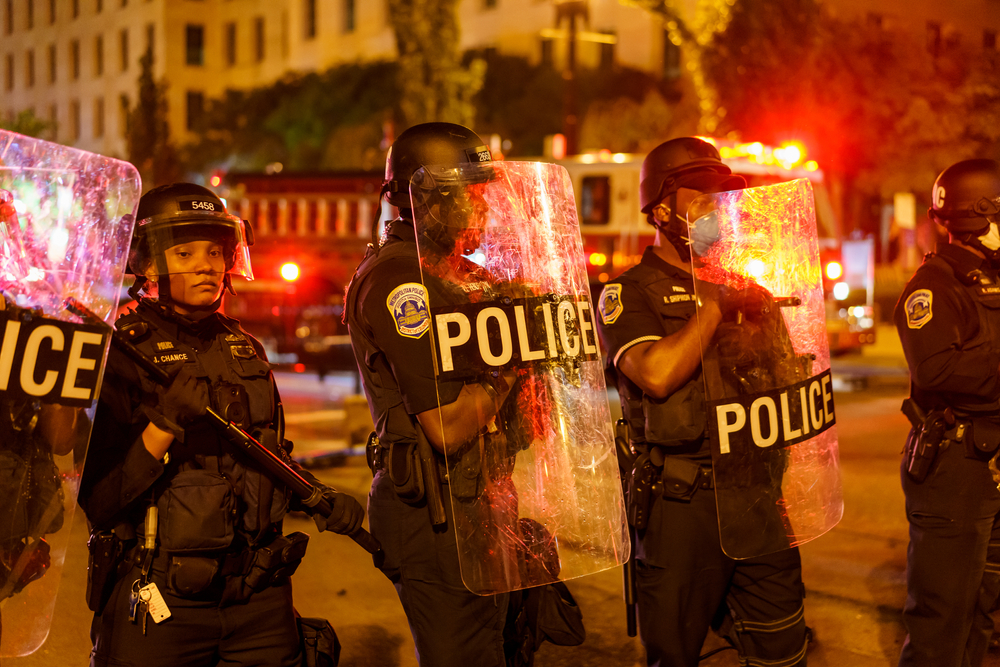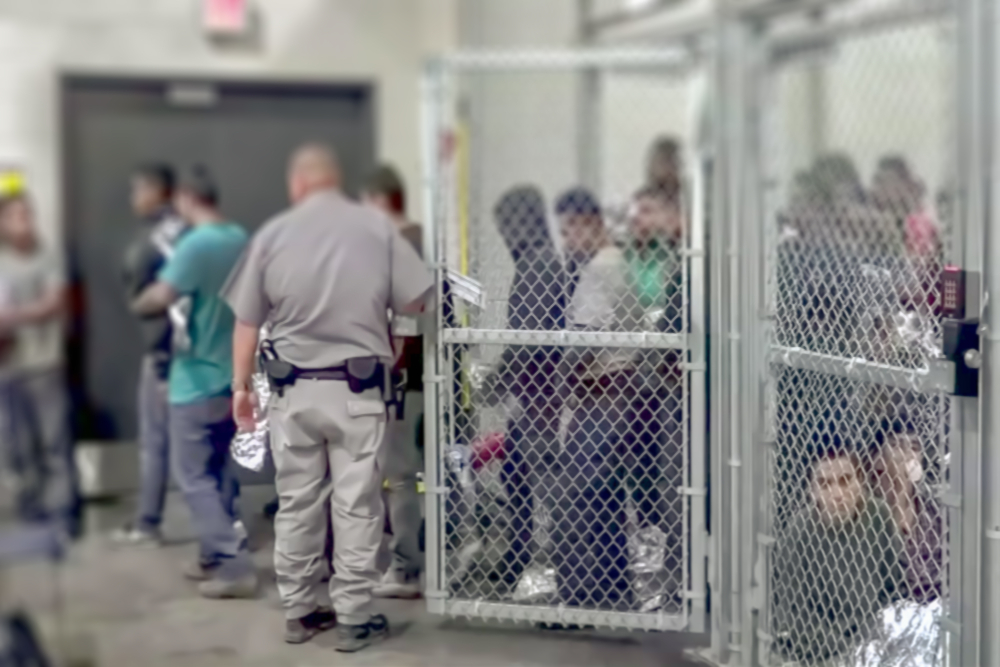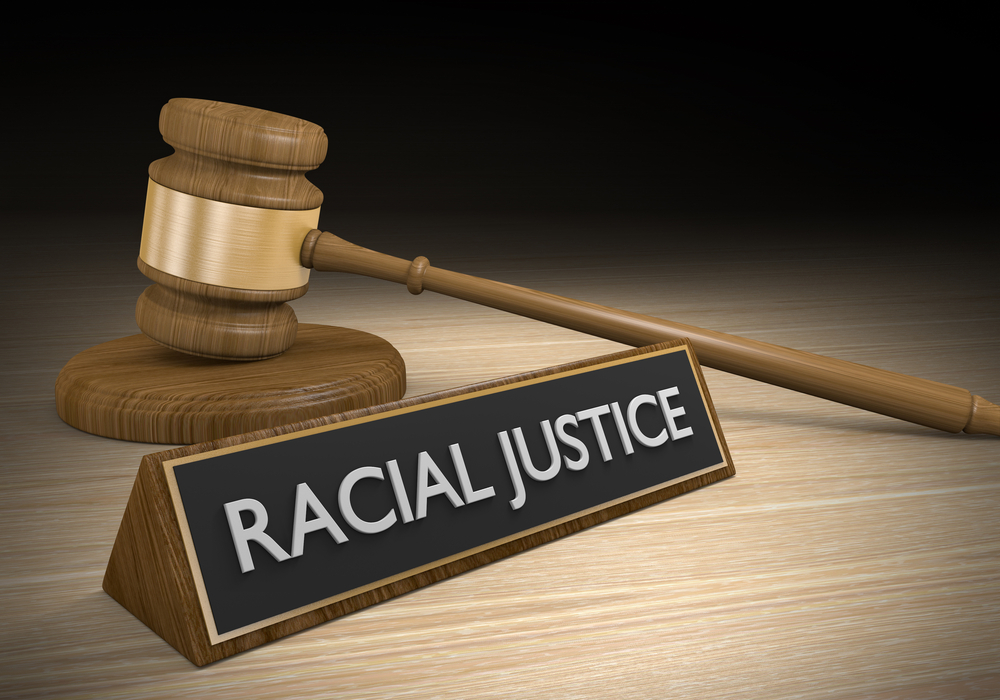The Supreme Court on Monday stood by its 50-year-old doctrine that many civil rights groups consider a shield for gross police misconduct. Even as protesters continue to take to the streets against police brutality, the court denied eight petitions addressing the qualified immunity doctrine, which can protect law officers from being sued, even in cases of egregious misconduct.
The doctrine allows civil suits only if it can be shown that an official’s actions violate “clearly established” case law and that the officer was aware of that.
RELATED: Predictive policing is predictably controversial
RELATED: Police surveillance cameras have time limits, Massachusetts court says
It now falls to Congress to determine if qualified immunity should be eliminated as it works on legislation to reel in police brutality. That could be an uphill battle, since President Trump has already made it clear he approves of the doctrine.
The American Civil Liberties Union expressed disappointment over the court’s decision.
“The Supreme Court’s deeply disappointing decision today to punt on the critical issue of official immunity, in this time of national reckoning over police violence, places the ball squarely in Congress’s court,” said David Cole, national legal director for the ACLU, in a Washington Post article.
Qualified immunity was initially established by the Supreme Court in 1967 and updated in 1982.
The doctrine initially asks two questions: Did police use excessive force; if so, did they know it was illegal because it violated a clearly established court ruling?
In the petitions before the high court, a number of civil rights groups asked that the policy be eliminated so police who use excessive force can be sued, whether or not a similar case has been decided previously.
It is the “clearly established” clause that causes the most concern among civil rights groups.
The idea behind the doctrine is to protect officers and other government employees from frivolous lawsuits and allow for mistakes made during spur of the moment decisions under dangerous circumstances.
But civil rights groups argue it simply allows for lawsuits to be tossed out if there is no prior court decision, even in egregious cases like that of George Floyd, a Minneapolis man killed recently by a police officer who kneeled on his neck for nearly 9 minutes.
“It’s worth stating that presumably the court is very aware of the current situation in the aftermath of Floyd’s death and how urgent it is to reconsider,” said Jay Schweikert, policy analyst with the Cato Institute’s Project on Criminal Justice.
Justice Sonya Sotamayor stated that qualified immunity has morphed since it was established, with the Supreme Court rarely intervening “where courts wrongly afford officers the benefit of qualified immunity in these same cases. Such a one-sided approach to qualified immunity transforms the doctrine into an absolute shield for law enforcement officers.”
Congress is now actively looking at qualified immunity. Two bills in the House would amend Section 1983 of the Federal Civil Rights statute, ending qualified immunity.
“It is not a constitutional doctrine. It is an interpretation of section 1983, so Congress has the authority to clarify the meaning of that statute,” Schweikert said. That could let the court off the hook, he continued. “But our view is that the Supreme Court created the problem and has a responsibility to fix it.”
In light of the recent introduction by the House of the Justice in Policing Act of 2020, the American Association for Justice issued a comment. AAJ CEO Linda Lipsen called on Congress to end qualified immunity.
“For more than 50 years, the unjust ‘qualified immunity’ doctrine has shielded law enforcement officers from lawsuits when they violate the civil rights of the people they are sworn to protect,” Lipsen said. “We call on Congress to end the qualified immunity doctrine and make other critical changes to federal law, including enhancing the collection and dissemination of policing information and reporting.”
But while Congress is working on legislation that would end the doctrine, the White House has commented that it is “a non-starter” for Trump. White House press secretary Kayleigh McEnany has declined to give any specifics on what Trump wants in the legislation, but specifically said he opposes ending the protection qualified immunity gives law officers.
The doctrine has been used for far too long, Schweikert said. “Those whose rights are violated must be able to seek justice and public accountability, especially when they or their families are targets of police violence and brutality.”
The decision comes at the same time George Floyd’s family and the families of Ahmaud Arbery and Breonna Taylor are calling for elimination of qualified immunity.
Two men are charged with tracking Arbery through a South Georgia neighborhood and fatally shooting him.
Taylor was killed by Louisville police who used a battering ram to break down her apartment door, then, after a brief exchange, shot her eight times, according to the New York Times. Police were using a no-knock search warrant, believing her apartment was used by a drug dealer to receive packages.
Corbitt v. Vickers
One of the petitions the court considered is a suit filed by a mother whose 10-year-old son was shot by a sheriff’s deputy in his backyard.
The petition, Amy Corbitt v. Michael Vickers, asked whether qualified immunity “is an affirmative defense (placing the burden on the defendant to raise and prove it) or whether it is a pleading requirement (placing the burden on a plaintiff to plead its absence); whether the Supreme Court should recalibrate or reverse the doctrine of Qualified Immunity.”
In July 2014, Vickers, a Coffee County deputy, entered Corbitt’s property in pursuit of a criminal. The deputies ordered everyone on the ground, including several children, according to Courthouse News. Standing two feet away from Corbitt’s 10-year-old son, Vickers fired two shots at the family dog, but one hit the child in the back of the knee.
Corbitt claimed the officers violated her son’s Fourth Amendment and 14th Amendment rights by using excessive force and for unlawful seizure and asked for $2 million in damages.
A U.S. District Judge ruled that while Vickers may not have intended to shoot the child, he did illegally “seize” the people in the yard, leading them to believe they were not free to go.
Vickers appealed. The 11th Court of Appeals then granted Vickers qualified immunity stating that the child’s right to not be shot in the leg had no “clearly established” case precedent.
The Federal Civil Rights Statute says nothing about immunity when a person’s rights are violated, Schweikert said.
“It is definitely possible to get around qualified immunity, but it is very difficult and it means whether or not you can get a remedy doesn’t determine if rights were violated or how egregious, but on the happenstance of which cases have already been decided,” he said. “It makes a mockery of the deterrent and remedial effects of Section 1983.”
Since qualified immunity was enacted and the “clearly established” segment was added in 1982, the Supreme Court has decided dozens of cases, almost always reversing lower courts that denied qualified immunity. “The Supreme Court is slapping them down, saying they were not exact enough,” Schweikert said.
Reuters Studies the Issue of Qualified Immunity
A Reuters investigation released in May addresses the issue of qualified immunity, calling it special protection for cops who kill.
It starts its investigative piece with information on a man named Johnny Leija, who was in a Madill, Oklahoma hospital sick with pneumonia, confused and agitated and refusing to return to his room. Three police officers shot him with a stun gun, then pinned him to the floor and moments later, the 34-year-old was dead.
Leija’s mother, Erma Aldaba, sued, claiming officers used excessive force, violating her son’s civil rights under the Fourth Amendment, which protects against unreasonable search and seizure. She quickly came up against qualified immunity.
The investigation by five Reuters journalists names several other cases where courts found police used excessive force, but still granted them immunity.
In many instances, lower courts do not even ask the first question that drives qualified immunity – did the officer use excessive force. If it is established an officer’s actions violated the Constitution because of established court precedent, the case goes to trial. If not, qualified immunity is granted.
“Courts don’t actually have to decide the merits questions,” Schweikert said. “The Supreme Court has given discretion on how to approach that. That is offensive enough, but what is even worse is when courts don’t answer that question of whether rights are violated.”
That means the same kind of excessive force can be used again and hit the court system, but will get the same result, qualified immunity, because it has not been “clearly established” as illegal.














